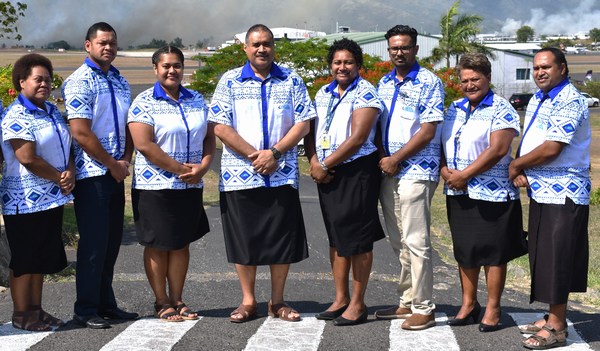Aviation Security gained global prominence following the tragic events of September 11 2001 which propelled it into the limelight and changed aviation forever. While aviation security has always been a prominent part of airport and airline operations in Fiji, it did not quite get the same attention, recognition, and support as other ministries. This all changed in the first 5 years of post-2001 with aviation security being at the forefront of government policy formulation with terrorism, drug trafficking, money laundering, and human smuggling.
The Aviation Security and Facilitation Department (ASFD) was established around 2001 with the recruitment of the first inspector trainee. In 2005, another 2 inspector trainees were recruited to strengthen the department followed by successive recruitments in 2008, 2016, 2017, 2019, and 2020. The ASFD has grown to include 8 staff; 5 Inspectors, 1 Licensing Officer, 1 Assistant Administration Officer and 1 Executive Manager.
The aviation industry has expanded rapidly with advancements in technology and the influx of new aircraft, new operators, increasing tourism (including sports and conventions), enticing holiday packages, emerging threats, and new security requirements. The onset of the digital age brings its own set of risks which makes it more challenging to safeguard aviation against acts of unlawful interference. The growth in aviation also resulted in a corresponding growth in aviation security. In keeping pace with this growth, the Authority also strategically positioned the aviation security department to cater for the growth.
In total, the department is responsible for monitoring and surveillance of over 75 operators that range from Air Cargo Operators (ACO), Regulated Agents (RA), Aviation Security Service Organisations (ASSO), Catering Service Providers, Ground Handling Service Providers (GHSP), Airport Operators – domestic, private and international), Airlines, Aviation Security Instructors, Aviation Security Quality Control Officers and Screeners (Cargo and Security).
The onset of the global COVID-19 pandemic has significantly impacted tourism and aviation and heralds a sad chapter in aviation. However, COVID-19 shall come to pass and aviation security will flourish again.

Departmental Function
The department deals with aviation security and facilitation services on the following matters:
-
Regulation of Aviation Security at Airports
-
National Aviation Security and Facilitation
-
Certification and Oversight of:
-
Aircraft operators
-
Catering agents
-
Air cargo operators
- Regulated agent
-
Ground handlers
-
Aviation Security Service Organisations
-
Oversight implementation of approved security programmes
-
Bilateral Inspection of Screening procedures and security controls at Air Pacific’s foreign destination airports
-
Investigation of breaches and incidents
-
SEMS & Aviation Security Education
-
National & Industry Consultation
National Civil Aviation Security Programme
The Fiji Islands National Civil Aviation Security Programme (NASP) outlines the organisation of aviation security within the Fiji Islands taking into account the provisions of ICAO Annex 17, and details the legal requirements and recommendations that constitute the Standards and Recommended Practices (SARP’s) which are necessary to safeguard civil aviation against acts of unlawful interference.
Airport Security Programme
The Airport Security Programme outlines the practices and procedures to be implemented by the Airport Operator taking into account the requirements of the National Civil Aviation Security Programme in order to safeguard civil aviation against acts of unlawful interference.
Airline Security Programme
The Airline Security Programme outlines the practices and procedures to be implemented by the Airline Operator taking into account the requirements of the National Civil Aviation Security Programme in order to safeguard civil aviation against acts of unlawful interference.
Air Cargo Security Programme
The Air Cargo Security Programme outlines the practices and procedures to be implemented by the Air Cargo Operator in fulfilling its responsibilities under the National Civil Aviation Security Programme in order to safeguard civil aviation against acts of unlawful interference.
Catering Services Security Programme
The Catering Service Security Programme outlines the practices and procedures to be implemented by the Catering Service Provider in fulfilling its responsibilities under the National Civil Aviation Security Programme in order to safeguard civil aviation against acts of unlawful interference.
![CAAF Logo (Final 17-11-24)[1]-02](https://www.caaf.org.fj/wp-content/uploads/2024/11/CAAF-Logo-Final-17-11-241-02-1.png#2188)